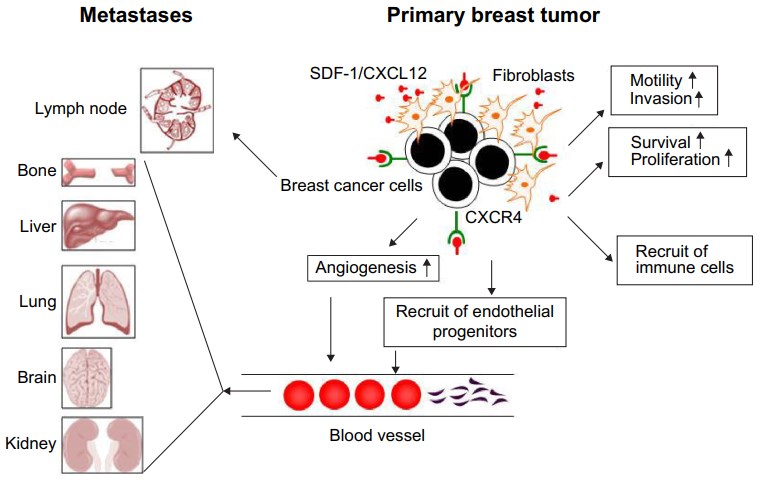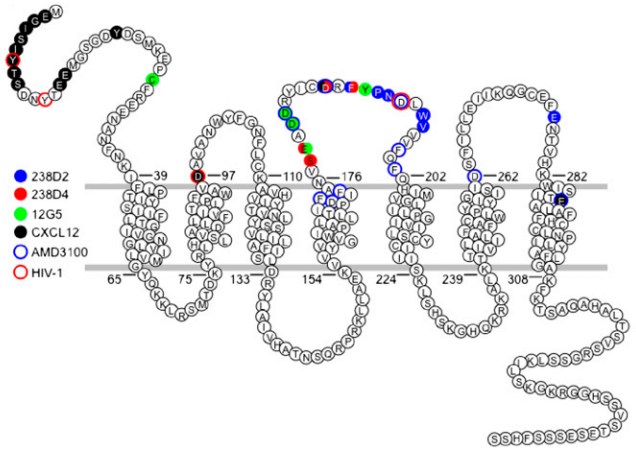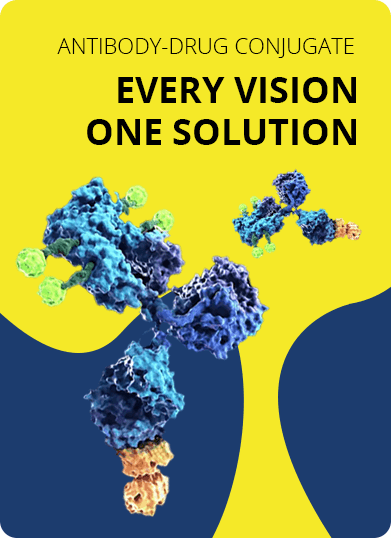- Home
- UTC Development
- Bispecific ADC Development
- Biparatopic Receptor based Bispecific ADC Development
- Biparatopic CXCR4-targeted Bispecific ADC Development
Biparatopic CXCR4-targeted Bispecific ADC Development Service
Antibody-drug conjugate (ADC) is becoming an attractive cancer therapeutic strategy that combines the unique targeting capabilities of monoclonal antibodies (mAbs) with the specific cancer killing ability of cytotoxic drugs. At the same time, the bispecific antibody (bsAb) as a growing class of immunotherapies continues to show significant and impressive therapeutic value. Recently, the combination of ADC and bsAb to form a novel therapeutic format named bispecific ADC is under active development and evaluation.
Creative Biolabs brings together the most renowned ADCs experts and long standing experience in antibody development to offer the best-in-class bispecific ADC development services. At present, we provide the novel bispecific biparatopic ADC design and construction service from optimized antibody selection to final conjugate characterization.
Background
Introduction of CXCR4
CXCR4 also known as fusin or CD184 is a chemokine receptor protein that is encoded by the CXCR4 gene in humans. It belongs to the large superfamily of G protein-coupled receptors possessing seven-transmembrane helices that interacts with its endogenous ligand, CXCL12 (SDF-1α). CXCR4 functions in a variety of biological processes, such as the trafficking and homeostasis of immune cells (such as T lymphocytes). CXCR4 is also highly expressed on many cancer cells that play important roles in tumor growth, invasion, angiogenesis, metastasis, relapse, and therapeutic resistance. Therefore, CXCR4 has been considered to be a prognostic marker in various types of cancer, including leukemia, breast cancer, and prostate cancer. Besides, CXCR4 is highly expressed in cancer metastasis that can result in enhanced signaling. Some drugs against the CXCR4 can disrupt tumor-stromal interactions and reduce tumor growth and metastatic burden. Thus, CXCR4 is regarded as a target for therapeutic intervention and noninvasive monitoring of disease progression and therapeutic guidance.
 Fig.1 Potential roles for CXCR4 in breast cancer.1
Fig.1 Potential roles for CXCR4 in breast cancer.1
Biparatopic CXCR4-targeted Bispecific ADC
Many potential ADC targets present poor internalization and undergo a high rate of endocytic recycling, which leads to the ADC to return to the cell surface intact without delivering the payload to the lysosome. Bispecific biparatopic antibodies have been used for ADC development recently, which endow the ability to recognize two distinct epitopes simultaneously and offer the potential to maximize the benefits of therapeutic ADCs. Several bispecific biparatopic ADCs have emerged recently and they can promote the internalization and trafficking to the lysosome to maximize the amount of drug and effectively carry drugs to tumor cells.
Two highly selective monovalent sdAbs targeting distinct epitopes of CXCR4, 238D2, and 238D4 were linked by a short peptide linkage to form a bispecific biparatopic antibody and showed significantly increased affinity for CXCR4 and picomolar activity in antichemotactic assays. Further research results indicated that the biparatopic CXCR4 sdAb has strong antiretroviral activity against T cell-tropic and dual-tropic HIV-1 strains. Besides, the biparatopic sdAb can effectively mobilize CD34-positive stem cells in the model animals. Thus, the biparatopic CXCR4 sdAb may be used in the ADC construction for CXCR4-positive cancer therapy.
 Fig.2 Epitope mapping of CXCR4 sdAbs.2
Fig.2 Epitope mapping of CXCR4 sdAbs.2
Our Service
Biparatopic CXCR4-targeted Bispecific ADCs Services
With a highly experienced team and world-class facilities, Creative Biolabs can offer a wide variety of services for ADCs development and manufacturing. Based on mature technology, cutting-edge antibody engineering, and bioconjugation platform, as well as comprehensive successful workflows, we now provide customized solution to produce bispecific biparatopic ADCs against different markers including the CXCR4 n. Our services are customized to accelerate the development of your own ADC.
Our ADCs services include:
- ADC Antibody Screening
- DrugLnk™ Custom Synthesis
- Antibody Design and Conjugation
- ADC in vitro Analysis
- ADC in vivo Analysis
For more information about our services, please contact us.
Highlights
- Superior Internalization Capability: The bispecific biparatopic design significantly enhances internalization, allowing for efficient delivery of cytotoxic drugs to CXCR4-expressing tumor cells.
- Dual-Epitope Engagement: The Biparatopic CXCR4-targeted Bispecific ADCs from Creative Biolabs utilize a unique dual-epitope binding strategy, significantly improving target specificity and reducing off-target effects in cancer treatment.
- Optimized Payload Delivery: These ADCs leverage precise bioengineering to ensure optimized delivery of cytotoxic payloads directly to CXCR4-expressing cells, enhancing therapeutic outcomes.
- Strategic Cancer Therapy: Creative Biolabs' Biparatopic CXCR4-targeted Bispecific ADCs are strategically designed to tackle CXCR4-mediated pathways in cancer, offering a promising approach to inhibit tumor progression and metastasis.
- Customized ADC Development: Creative Biolabs offers tailored ADC services, from antibody screening to in vivo analysis, to develop bespoke bispecific biparatopic ADCs against various cancer markers.
FAQ
-
Q: How does the biparatopic approach enhance CXCR4-targeted ADCs?
A: Creative Biolabs' biparatopic ADCs target CXCR4 by recognizing two distinct epitopes simultaneously, increasing the internalization and lysosomal trafficking of the drug, thereby enhancing the therapeutic efficacy against CXCR4-positive cancers.
-
Q: What makes CXCR4 a significant target in cancer therapy?
A: CXCR4 plays critical roles in tumor growth, metastasis, and therapeutic resistance, making it a valuable target for interventions. It is highly expressed in several cancers, influencing disease progression and serving as a key marker for therapeutic targeting.
-
Q: Can you describe the specific advantages of using biparatopic CXCR4-targeted ADCs?
A: Biparatopic CXCR4-targeted ADCs, developed by Creative Biolabs, offer enhanced binding affinity and increased drug delivery efficiency to tumor cells, resulting in improved antitumor activity and reduced metastatic burden.
-
Q: What is the mechanism of action for biparatopic CXCR4-targeted bispecific ADCs?
A: Biparatopic CXCR4-targeted bispecific ADCs engage two distinct epitopes on the CXCR4 receptor, promoting robust internalization and efficient delivery of the cytotoxic payload directly to the cancer cells, maximizing therapeutic impact.
-
Q: What are the potential clinical applications of biparatopic CXCR4-targeted bispecific ADCs?
A: These advanced ADCs are being explored for their potential to treat a variety of CXCR4-expressing cancers, including leukemia, breast, and prostate cancers, offering a promising therapeutic strategy for managing aggressive and metastatic tumors.
Featured Products
Anti-CXCR4 ADC
| Catalog | Product Name | Antibody |
| ADC-W-386 | Anti-CXCR4 (ulocuplumab)-pAcF-MMAF ADC | Humanized Anti-CXCR4 lgG4 Antibody, ulocuplumab |
| ADC-W-519 | Anti-CXCR4-PEG-S-4FB-dasatinib ADC | Humanized Anti-CXCR4 Antibody |
| ADC-W-520 | Anti-CXCR4-dasatinib ADC | Humanized Anti-CXCR4 Antibody |
| ADC-W-1922 | Anti-CXCR4 (Ulocuplumab)-SMCC-DM1 ADC | Human Anti-CXCR4 IgG4-kappa antibody, Ulocuplumab |
| ADC-W-1923 | Anti-CXCR4 (Ulocuplumab)-SPDB-DM4 ADC | Human Anti-CXCR4 IgG4-kappa antibody, Ulocuplumab |
References
- Xu, C.; et al. CXCR4 in breast cancer: oncogenic role and therapeutic targeting. Drug design, development and therapy. 2015, 9: 4953.
- Jähnichen, S.; et al. CXCR4 sdAbs (VHH-based single variable domains) potently inhibit chemotaxis and HIV-1 replication and mobilize stem cells. Proceedings of the National Academy of Sciences. 2010, 107(47): 20565-20570.
For Research Use Only. NOT FOR CLINICAL USE.

Online Inquiry
Welcome! For price inquiries, please feel free to contact us through the form on the left side. We will get back to you as soon as possible.
